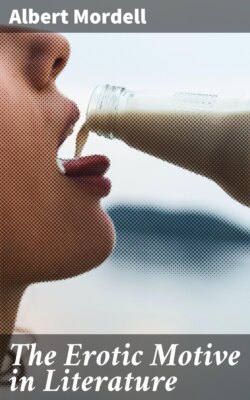Читать книгу The Erotic Motive in Literature - Albert Mordell - Страница 10
На сайте Литреса книга снята с продажи.
II
ОглавлениеTable of Contents
Men may be engaged in philanthropic or political movements; they may love their work intensely; they may be consummating an ambition; they may make sacrifices in performing their duties; but withal their minds are pondering on some particular woman, or on women in general. We hold imaginary conversations with women we have known, whom we know, or whom we would like to know. We think about the feminine faces we meet in the streets, and experience a passing melancholy because we are unacquainted with some of the girls we see. Undue interest in the opposite sex is of course also characteristic of women. They adorn their persons and choose their styles in dress with the object of physically attracting the male.
Those who are unhappy in love or marriage do not find themselves compensated for their misfortune by the fact that they may possess great wealth, or have a name that is respected or crowned with glory. The careers of Lord Nelson and Parnell show that national saviours and leaders may be engulfed in a grand passion whose fortunate outcome may be to them possibly as momentous as the welfare of their country. The fact that Anthony was a general on whose move the saving of his country depended, did not make him the less interested in Cleopatra. The fact that Abelard was a philosopher did not make him hold his studies higher than he did Heloise. There was really nothing abnormal about these men. Modern writers have been attracted to them. Shakespeare chose Anthony as the hero of his play, and Pope's famous Epistle shows his interest in Abelard. The amorous adventures of great military leaders like Cæsar and Napoleon are well known.
The love affairs of many literary men make us almost conclude that they were more concerned about their loves than their art. Recall Stendhal's famous cry about his perishing for want of love or Balzac's eternal ambition to be famous and to be loved. Goethe once exclaimed that the only person who was happy was he who was fortunate in his domestic affairs. He made every one of his love affairs the basis of some poem, novel or play; and not to know anything about his love for Charlotte Buff, or Frederica or Lili, or Frau von Stein, is to limit oneself in being able to appreciate Goethe, in being able to understand Werther, Faust, Wilhelm Meister and other works by him.
And we love these poets and writers who naïvely confessed that they did not care for aught in life but love, and who sang of their troubles frankly. Who does not find Catullus and Tibullus sweet? Who that has read them does not cherish the lyrical cries of the Troubadours or the poems of the Chinese poets of the T'ang period? Can any one help thinking of Burns or De Musset without affection and sympathy? And there are many who would not surrender the great body of sonnets and lyrics of England's poets for her colonies. And why is this? Because these poets are ourselves speaking for us and saying what we feel but are unable to express. The cry of the mediæval Persian or Japanese poet is our own cry. His joy is ours and he is we and we are he. Once a poem has left its author's pen it is no longer a mere personal record, but becomes an enduring monument of art in which millions of men discern a grief or gladness that they too have known. In a measure, literature is more real and eternal than life itself. It makes the past live and it holds a soul that can sway millions of people for ever and ever. As Cicero said in his speech for Archias the poet: "If the Iliad had not existed, the same tomb which covered Achilles' body would also have buried his renown."
